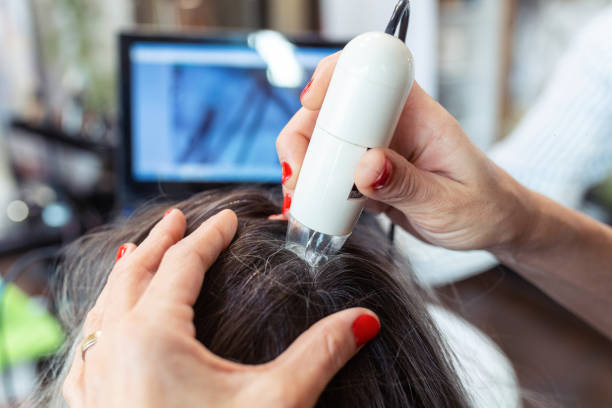Hair Loss Treatment: Effective Solutions for Regaining Confidence

Hair Loss Treatment Islamabad is a common concern for millions of men and women worldwide. While it is normal to shed between 50-100 hairs per day, excessive hair loss can be distressing and impact self-esteem. Hair loss can occur due to various reasons, including genetics, hormonal imbalances, stress, medical conditions, and even nutritional deficiencies. Fortunately, there are several treatment options available to address hair loss, ranging from over-the-counter products to surgical interventions. In this blog, we’ll explore the most effective hair loss treatments, helping you understand how to regain your hair and confidence.
Understanding the Causes of Hair Loss
Before diving into treatments, it’s essential to understand the common causes of hair loss:
Genetics (Androgenetic Alopecia): The most common form of hair loss, known as male or female pattern baldness, is hereditary. It typically occurs as people age, with men experiencing receding hairlines and bald spots, while women see thinning hair along the top of the scalp.
Hormonal Changes: Hormonal shifts due to pregnancy, childbirth, menopause, or thyroid problems can cause temporary or long-term hair loss.
Medical Conditions: Conditions like alopecia areata (an autoimmune disease causing patchy hair loss), scalp infections, and illnesses like lupus can lead to significant hair shedding.
Medications and Treatments: Some medications, including those used for cancer, heart disease, arthritis, and depression, may have hair loss as a side effect.
Stress (Telogen Effluvium): Physical or emotional stress can push hair into a resting phase, causing sudden hair shedding. The hair often regrows after the stressor is removed.
Nutritional Deficiencies: A lack of essential vitamins and minerals, particularly iron, zinc, and biotin, can weaken hair follicles and cause thinning hair.
Over-the-Counter (OTC) Hair Loss Treatments
Minoxidil (Rogaine)
Minoxidil is one of the most popular and FDA-approved treatments for hair loss. It comes in both liquid and foam formulations and is applied directly to the scalp. Minoxidil works by increasing blood flow to the hair follicles, stimulating hair growth, and slowing down hair loss.
How to use: Apply Minoxidil twice daily to the affected areas of the scalp. Results may take several months to become noticeable, and continued use is necessary to maintain any regrowth.
Side effects: Some users may experience mild scalp irritation or unwanted facial hair growth if the product spreads to unintended areas.
Ketoconazole Shampoo
Ketoconazole is an antifungal shampoo that can help reduce inflammation and promote healthier scalp conditions. Some research suggests that ketoconazole may also block DHT (dihydrotestosterone), the hormone responsible for androgenetic alopecia.
How to use: Use the shampoo 2-3 times a week, leaving it on for a few minutes before rinsing to allow the active ingredients to work.
Side effects: Scalp dryness and irritation can occur with frequent use.
Prescription Hair Loss Medications
Finasteride (Propecia)
Finasteride is an oral medication used primarily by men to treat androgenetic alopecia. It works by blocking the conversion of testosterone into DHT, reducing the levels of the hormone that shrinks hair follicles.
How to use: Finasteride is taken as a daily pill, and results may take several months to appear.
Side effects: Some users may experience sexual side effects, such as decreased libido or erectile dysfunction. It is not recommended for women, particularly those who are or may become pregnant.
Spironolactone
Spironolactone is an anti-androgen medication often prescribed to women experiencing hair loss due to hormonal imbalances, such as polycystic ovary syndrome (PCOS). It helps block the effects of androgens that can lead to hair thinning.
How to use: Taken orally, Spironolactone can reduce hair loss and may promote regrowth.
Side effects: Possible side effects include dizziness, fatigue, and increased potassium levels. Regular monitoring is recommended during treatment.
Natural and Alternative Treatments
Nutritional Supplements
Supplements like biotin, iron, zinc, and vitamin D are often recommended for individuals with hair loss caused by nutritional deficiencies. While supplements may not reverse genetic hair loss, they can improve hair strength and overall health.
How to use: Take supplements as directed by a healthcare provider, especially if a deficiency has been diagnosed.
Side effects: Overconsumption of certain vitamins or minerals can be harmful, so it’s important to follow recommended dosages.
Essential Oils
Essential oils like rosemary, peppermint, and lavender have been used for centuries to promote hair growth and scalp health. Although scientific research is limited, many people report positive results from using essential oils.
How to use: Dilute essential oils with a carrier oil (such as coconut or jojoba oil) and massage into the scalp several times a week.
Side effects: Skin irritation or allergic reactions may occur, especially if oils are not properly diluted.
Platelet-Rich Plasma (PRP) Therapy
PRP therapy is a cutting-edge treatment that involves injecting platelet-rich plasma from the patient’s blood into the scalp. This process is believed to stimulate hair follicles and encourage hair growth.
How to use: PRP therapy typically requires multiple sessions and is performed by a medical professional.
Side effects: Some discomfort, swelling, or bruising at the injection site is possible.
Surgical Hair Loss Treatments
Hair Transplant Surgery
Hair transplant surgery is a permanent solution for those with significant hair loss. The two main techniques are Follicular Unit Transplantation (FUT) and Follicular Unit Extraction (FUE). Both methods involve transferring hair follicles from a donor site (usually the back of the scalp) to the thinning or balding areas.
How it works: The procedure is performed under local anesthesia, and results can take several months to become fully visible.
Side effects: Scarring, infection, and the high cost are potential downsides of hair transplant surgery.
Scalp Micropigmentation (SMP)
Scalp micropigmentation is a non-surgical cosmetic procedure that uses micro-needles to apply pigment to the scalp, creating the illusion of thicker hair. This technique is ideal for people with thinning hair or those looking to enhance the appearance of a shaved head.
How it works: Multiple sessions are usually required to achieve the desired look, and the results are long-lasting.
Side effects: Temporary redness or irritation may occur after the procedure.
Lifestyle Changes for Hair Health
Healthy Diet: Eating a well-balanced diet rich in vitamins, minerals, and proteins is essential for maintaining healthy hair. Include foods like eggs, spinach, fish, and nuts, which are packed with hair-boosting nutrients.
Stress Management: Chronic stress can trigger hair loss, so practicing relaxation techniques like yoga, meditation, or regular exercise can help reduce stress and promote hair growth.
Gentle Hair Care: Avoid excessive heat styling, tight hairstyles, or harsh chemical treatments that can damage hair and exacerbate hair loss. Opt for gentle, sulfate-free shampoos and conditioners to nourish the scalp and hair.
Conclusion
Hair loss can be an emotional and frustrating experience, but there are many treatment options available to slow or reverse the process. From OTC treatments like Minoxidil and ketoconazole shampoo to prescription medications such as Finasteride and Spironolactone, each solution offers potential benefits. For more permanent solutions, surgical options like hair transplants and cosmetic procedures like scalp micropigmentation can provide long-term results. Always consult with a healthcare provider or dermatologist to determine the most appropriate treatment for your specific needs. With the right approach, it’s possible to restore both your hair and your confidence.
Note: IndiBlogHub features both user-submitted and editorial content. We do not verify third-party contributions. Read our Disclaimer and Privacy Policyfor details.











